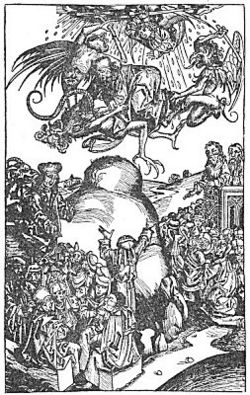In Acts 8:9-24 we are told of Simon Magus, according to
Acts a kind of sorcerer, but more likely to be one of the many leaders of
religious sects. This Simon was baptized and when he saw the powers of the Apostles
in healing people, he offered them money for receiving these powers too. By various early Christian authors he is
mentioned as the founder of a sect, but little is further known of this sect.
Simon had however also a further life in Christian texts as the arch-briber and
his name became synonym with the buying and selling of lucrative ecclesiastical
functions. In the apocryphal Acts of Peter (ca. 250 AD?) we are told of a
contest at Rome between Saint Peter and Simon Magus. The latter shows his power
by flying through the air, but Peter prays that he may fall and thus happens.
Simony was endemic in the High Middle Ages, much to the
frustration of poor scholars and clergymen, but apart from satirizing there was
little they could do. One such a satire is Carmina
Burana 10: in short and biting lines the author complaints about the practise
of simony. Almost every line is an allusion to the Vulgate, of which I have
noted a few. There is no English translation of this song. The text is taken from
the critical edition by Hilka/ Schumann (1930-197)).
Carmina Burana 10.
Ecce sonat in aperto in
the open
vox clamantis in deserto: Mt.
3:3, Isaiah 40:3
nos desertum, nos deserti, we (are) the desert, we are deserted
nos de pena
sumus certi. pena = poena (punishment)
nullus fere vitam querit, fere: almost, vitam = Christ
et sic omne
vivens perit. querit = quaerit (seeks)
omnes quidem sumus rei, pereo: to pass away, reus: guilty
nullus
imitator Dei,
nullus vult
portare crucem,
nullus Christum sequi ducem. as leader
quis est
verax, quis est bonus, verax: truthful
vel quis Dei
portat onus? onus oneris (n.) : burden
ut in uno claudam plura: let
me finish much in one word
mors extendit sua iura.
iam mors regnat in prelatis: prelatus: bishop
etc.
nolunt sanctum dare gratis, sanctum: the
sacraments
quod promittunt sub ingressu, at the start of their office
sancte mentis in excessu; in
ecstasy with their `holy’ mind
postquam sedent iam securi,
contradicunt sancto iuri.
rose fiunt saliunca, saliunca: wild nard, i.e. weed
domus Dei fit spelunca. den
(of thieves)
sunt latrones, non latores, latro (m.)
robber, lator (m.): bringer
legis Dei
destructores.
Simon sedens
inter eos
dat magnates esse reos. he
makes the powerful guilty
Simon prefert malos bonis, bad persons over good
Simon totus
est in donis,
Simon regnat apud Austrum, (kingdom of) the South, cf Dan. 11.5; Mt 12.42
Simon frangit omne claustrum. breaks open every lock
cum non datur, Simon stridet, strideo: to make a
harsh moise
sed si detur, Simon ridet;
Simon aufert, Simon donat, aufero: to take
away
hunc expellit, hunc coronat, expello: to expel,
drive away
hunc circumdat gravi peste, surrounds with a severe illness
illum nuptiali veste; wedding
clothes
illi donat diadema,
qui nunc erat
anathema. anathema: forbidden, e.g. Deut. 7.26; Jos. 7.13
iam se Simon non abscondit, abscondo: to hide,
conceal
res permiscet
et confundit. permisceo: to confuse
iste Simon confundatur, confundo: to confound, put to shame
cui tantum posse datur! tantus: so much
Simon Petrus hunc elusit Saint
Peter deceived him
et ab alto iusum trusit; and
drove (trudo) him down (iusum) from the high sky;
dum superbit motus penna, while
he (Simon) took pride moved by feathers,
datus fuit in gehenna. he
was given to hell
quisquis eum imitatur,
cum eodem puniatur let
him be punished in the same way
et sepultus in infernum sepelio: to burry
penas luat in eternum! Amen. let him pay his penalty forever!

The death of Simon Magus, from the Nuremberg Chronicle
(1493)
No comments:
Post a Comment